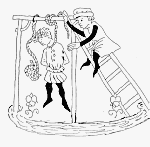Meet the Middle Ages
BackDeath penalty or the whipping for theft

A thief was severely punished.
"If someone, who has not been arrested for theft before, steals, he may not be hanged for less than the one mark ´s worth, except if he steals from the church or at the baths or from his master, then he may be hanged for half a mark. For half a mark a thief shall be put in the stocks and lose both ears, for three "öre" he loses his skin. And all will have to leave town.""
Stealing things worth a mark or more meant death penalty. If you had stolen from a church or at the baths, half a mark was enough to sentence you to death. One mark was equal to about four months’ pay for a worker or a barrel of beer (150 litres), or a barrel of herring. Stealing for more than half a mark meant being put in the stocks or lose one’s ears. To lose one’s skin meant getting whipped.
Three öre equalled a couple of days’ wages for a worker, today perhaps 2000 Swedish crowns. For a theft of this sum, the law prescribed whipping.
The punishment given was nearly always less severe than the law stated. Therefore, the death-penalty was rather unusual. Instead, the council tried to make a deal with the person who was a victim of the crime. The death penalty was then converted to a fine. Sometimes, the death-penalty could be changed into whipping.